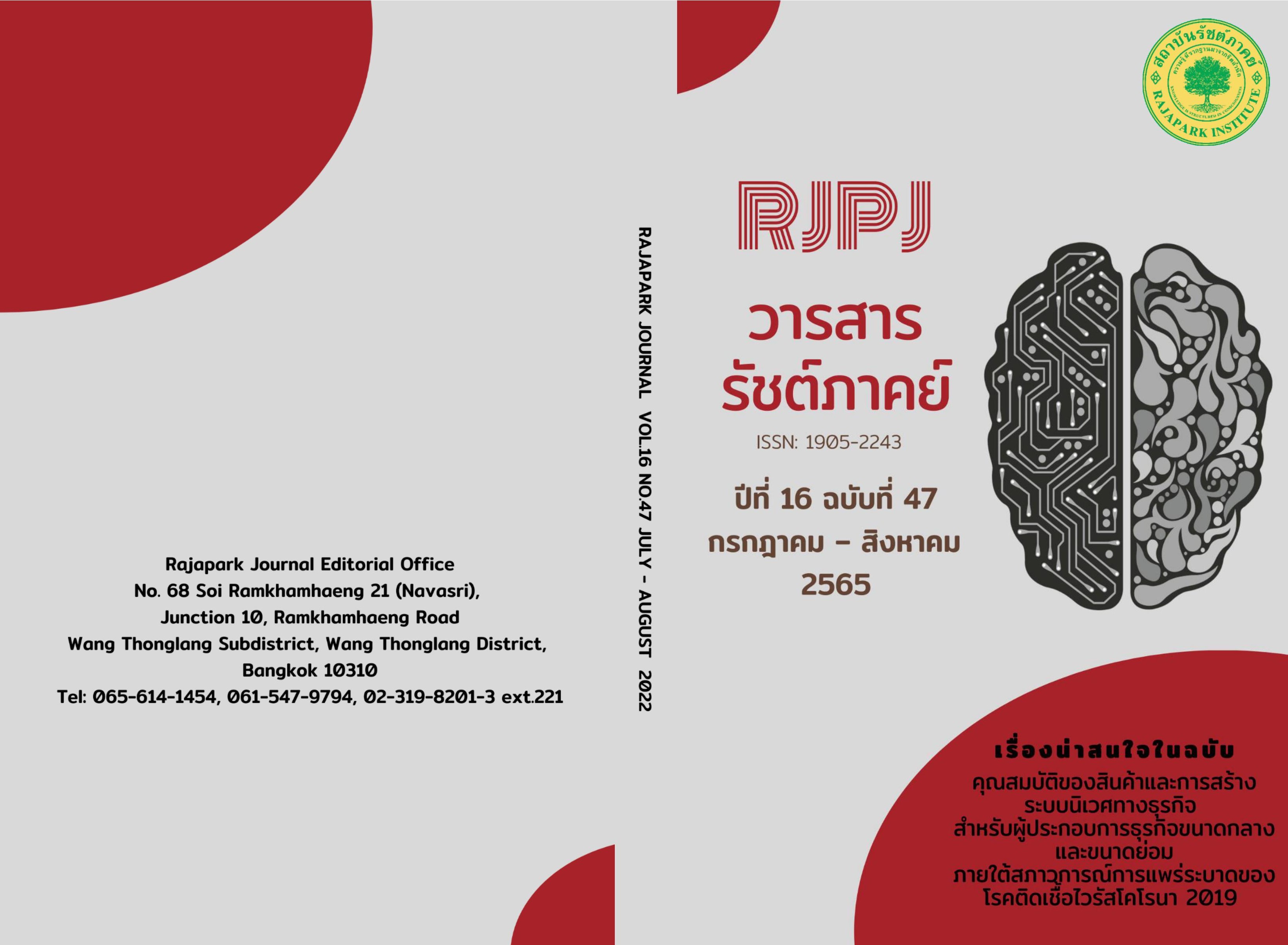Situations, Need Assessment and Guidelines for Teacher Development in Active Learning Management of Schools Under Nakhon Phanom Primary Educational Service Area Office 2
Main Article Content
Abstract
The purposes of this research were (1) to study the current situations and the desirable situations of teacher development in active learning management; (2) to study the needs of teacher development in active learning management; and (3) to develop guidelines for teacher development in active learning management of schools under the Office of Nakhon Phanom Primary Educational Service Area. 2. This research was qualitative research. The samples consisted of 328 school administrators and teachers. There were four instruments used in this research: (1) the questionnaire in current situations of active learning management; (2) the questionnaire in desirable situations of active learning management; (3) a structured-interview form with the Index of Item Congruence; and (4) a suitability and possibility assessment form guidelines for developing active learning management of schools under the Office of Nakhon Phanom Primary Educational Service Area 2. The statistics employed were percentage, mean, standard deviation, and the index Modified Priority Needs Index (PNIModified). The results were as follows: (1) the overall current situations of active learning management were at the high level, and the overall desirable situations of active learning management were at the highest level; (2) the needs of teacher development about active learning, Top skill is Collaborative Learning Group; and (3) the guidelines for developing in active learning management, teachers should manage student-centered learning through self-paced, step-by-step research, and emphasis on critical thinking skills.
Article Details

This work is licensed under a Creative Commons Attribution-NonCommercial-NoDerivatives 4.0 International License.
Views and opinions appearing in the Journal it is the responsibility of the author of the article, and does not constitute the view and responsibility of the editorial team.
References
Ekphet, C. (2019). To Become a Professional Executive. Surat Thani Rajabhat University.
Juychum, D., Bowchamchoy, K., & Kanthong, S. (2016). The Enhancement of Learning Achievement of Students on Thinking Skills of Thinking Skills Module (11-024-112) Employing the Active Learning Method, 1st Semester of Academic Year 2015. Princess of Narathiwat University Journal of Humanities and Social Sciences, 3(2), 47-57. https://so05.tci-thaijo.org/index.php/pnuhuso/article/view/61720/50845
Khamanee, T. (2013). Pedagogical Science: Knowledge for Effective Learning Process Management. Chulalongkorn University.
Kilian, M., & Bastas, H. (2015). The Effects of Team-Based Learning on Students’ Attitudes and Students’ Performances in Introductory Sociology Classes. Journal of the Scholarship of Teaching and Learning, 15(3), 53-67. https://doi.org/10.14434/josotl.v15i3.12960
Kolb, A.Y., & Kolb, D.A. (2005). Learning Styles and Learning Spaces: Enhancing Experiential Learning in Higher Education. Academy of Management Learning & Education, 5(4), 193-212. https://www.jstor.org/stable/40214287?seq=1
Laowreandee, W. (2013). Thinking Skills Instructional Models and Strategies (10th ed.). Silpakorn University.
Nakhon Phanom Primary Educational Service Area Office 2. (2020). Nakhon Phanom: Policy and Plan Group. https://www.nkp2.go.th
Panich, W. (2013). Creating Learning for the 21st Century. Siam Commercial Foundation. https://www.scbfoundation.com/
Pantaewan, P. (2016). Development of Students in the 21st Century with Active Learning in Nursing Profession. Journal of The Royal Thai Army Nurses, 17(3), 17–24. https://he01.tci-thaijo.org/index.php/JRTAN/article/view/73072
Ponlunhit, J., Nualpang, K., & Angganapattarakajorn, V. (2018). The Effects of Using Experiential Learning Management on Mathematical Problem Solving Skills and Connection Skills of Mathayomsuksa 3 Students. Journal of Curriculum and Instruction, 10(27), 15-26. https://jci.snru.ac.th/ArticleViewFile?ArticleID=28&FileArticle=28-ArticleTextFile-20190813004802.pdf
Prompasit, P. (2015). Active Learning (AL) for HuSo at KPRU. Kamphaeng Phet Rajabhat University. https://huso.kpru.ac.th/File/KM%20BOOK-58.pdf
Raunroui, B. (2020). Development of Active Learning Management by Using the Supervision Process for teachers in Prachanikom 4 School under Chumphon Primary Educational Service Area Office 1[Independent Study, Surat Thani Rajabhat University].
http://ir.sru.ac.th/bitstream/123456789/761/1/Buppha.pdf
Rochanasmita. Arnold, S. (2012). Active Learning Management to Develop Learning Behaviors and Ideas about Learning Management of Students Phranakhon Rajabhat University. Phranakhon Rajabhat University.
Sariwat, L. (2014). Psychology for Teachers. Odeon Store.
Srisa-ard, B. (2017). Preliminary Research (10th ed.). Suwiriyasan.
Sakulrattanakulchai, S. (2017). The Effect of Active Learning Method on Students’ Self-learning Capacity. Journal of Research Methodology, 30(2), 229-251. https://portal.edu.chula.ac.th/pub/jrm/index.php/jrm/article/view/589/pdf_v30i2_a05
Silberman, M. (1996). Active Learning. Allyn & Bacon.
Symeonidis, V., & Schwarz, J.F. (2016). Phenomenon-Based Teaching and Learning through the Pedagogical Lenses of Phenomenology: The Recent Curriculum Reform in Finland. Forum Oświatowe. 28(2), 31-47.
The Faculty of Medicine, Prince of Songkla University. (2016). Active Learning. PSU Medical Education Newsletter, 2(1), 2-4. https://meded.psu.ac.th/newmeded/document/related/59_1.pdf
The Office of the National Primary Education Commission. (2010). Research for Learning Development. Office of the National Primary Education Commission.
The Office of the Basic Education Commission (OBEC), Ministry of Education. (2019). Development and Promotion of Active Learning Management According to the Moderate Class, More Knowledge. OBEC. http://academic.obec.go.th/images/document/1603180137_d_1.pdf
Thongphukdee, L., & Chulsiriphong, S. (2018). The Development of Learning Management Ability of Basic Education Schools Teachers in Nakhon Ratchasima to Improve 21st Century Students’ Learning Results by Using Cooperative Learning. NRRU Community Research
Journal, 12(1), 139-153. https://so04.tci-thaijo.org/index.php/NRRU/article/view/161732/116643
Torrecilla, J.S., Gutiérrez-de-Rozas, B., & Cancilla, J.C. (2021). Thinking-Based Learning at Higher Education Levels: Implementation and Outcomes within a Chemical Engineering Class. Journal of Chemical Education, 98(3), 774-781. https://doi.org/10.1021/acs.jchemed.0c00283
Wongkumsin, T., & Singhwee, C. (2020). Project-based Learning for Development Self-directed Learning. Social Sciences and Humanities Journal, 46(1), 218-253.
Wongwanich, S. (2015). Needs Assessment Research (3rd ed.). Chulalongkorn University.


